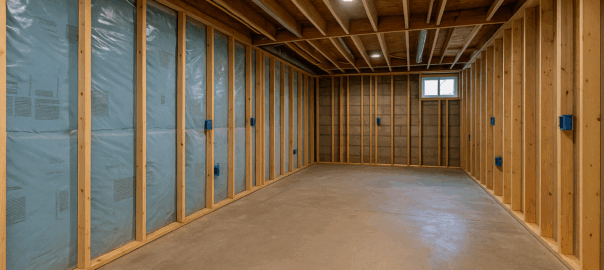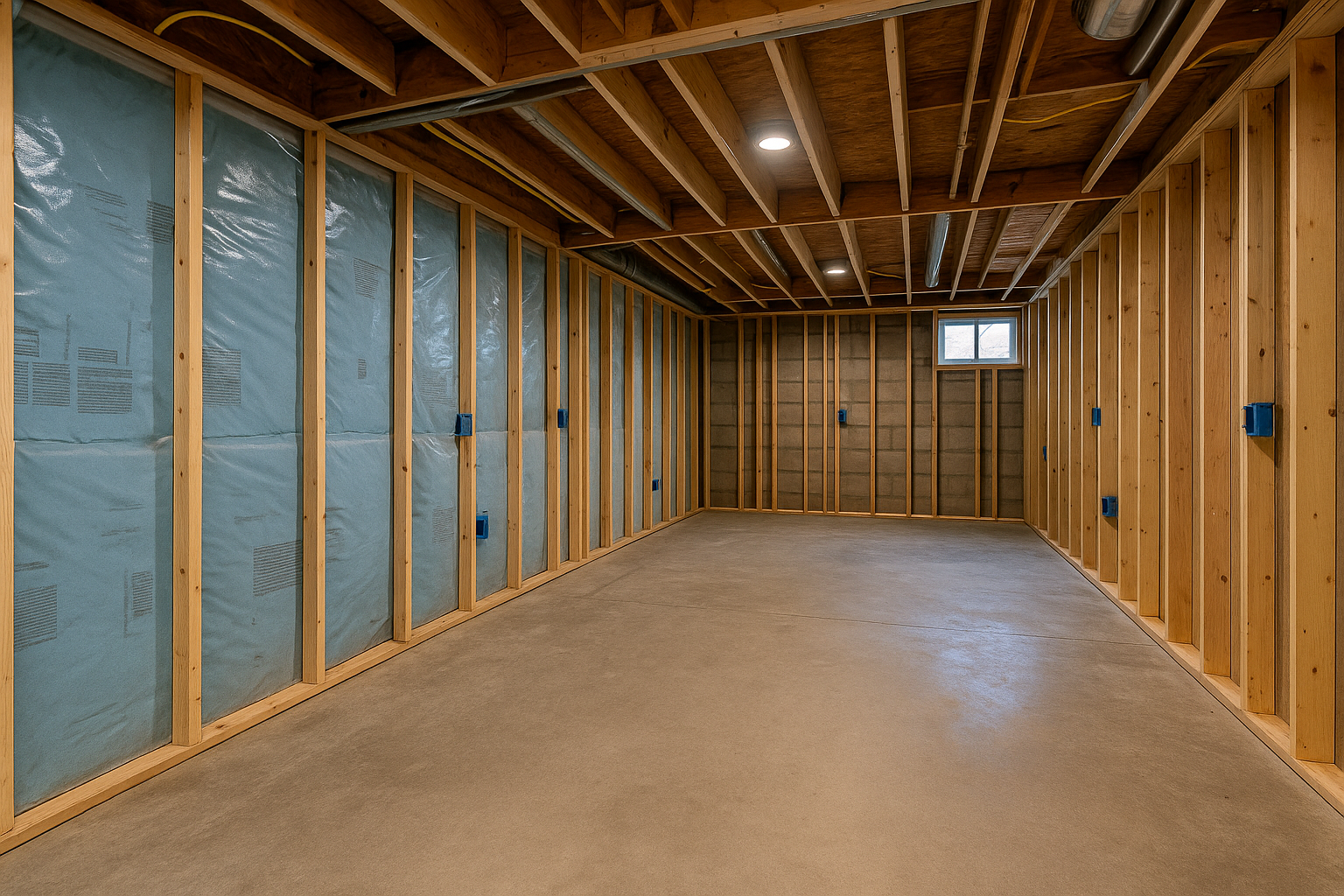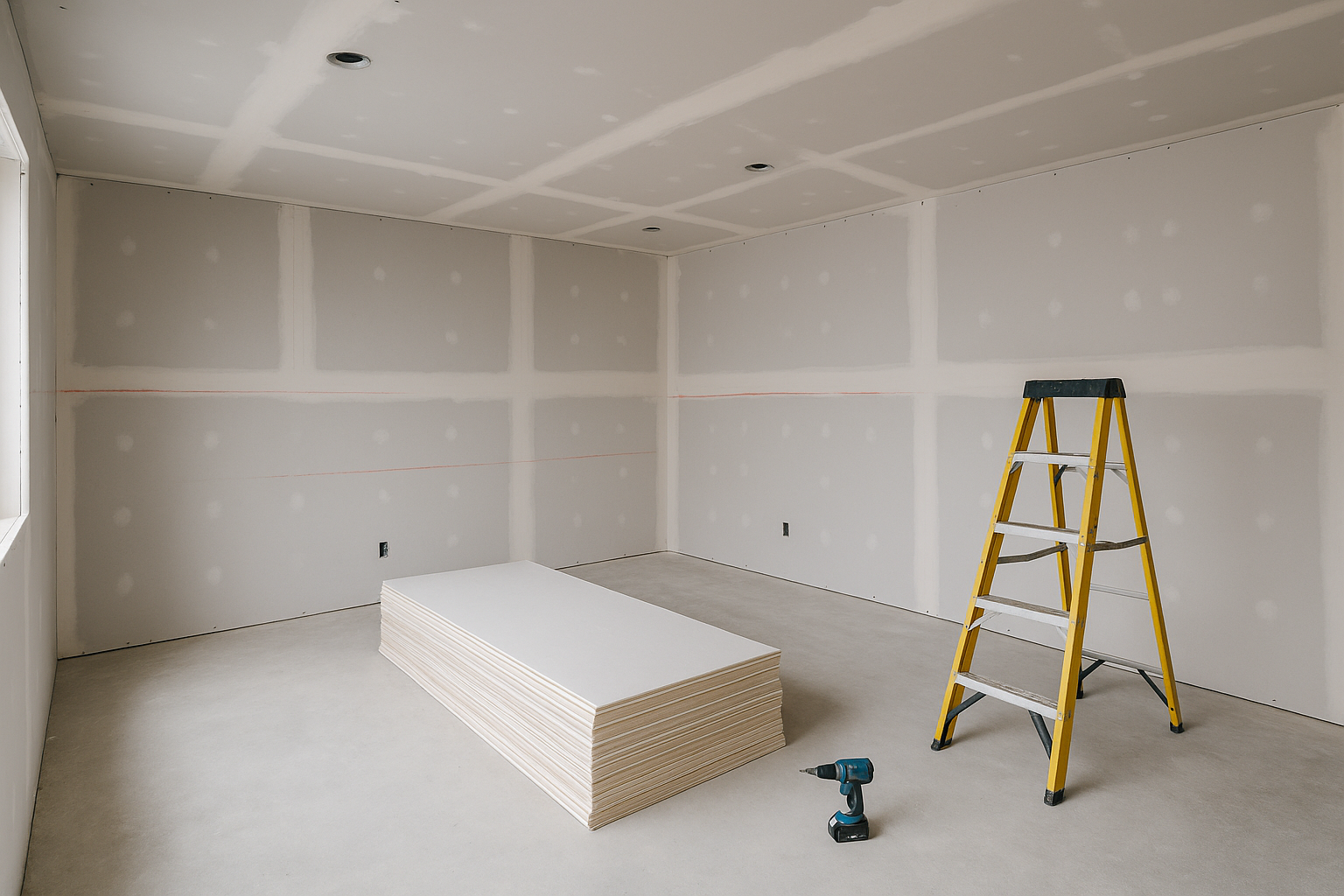For basement finishing, a permit is typically required due to potential structural, electrical, or plumbing modifications. Local building codes mandate permits for safety and compliance, guaranteeing the project meets egress, insulation, and fire safety standards. To proceed, obtain detailed plans, complete an application, and schedule inspections. Hiring licensed professionals guarantees compliance with building codes, while coordinating with local authorities prevents legal issues. Discover extensive steps and challenges involved in acquiring the necessary permits for basement finishing.
Remodel Basement Project
Any remodel involving a basement project often requires a permit. From drywall to electrical upgrades, remodeling ensures your basement space becomes a safe and functional extension of your home. Even cosmetic updates may connect to structural or mechanical changes, making permits a vital part of finishing your basement.
Basement Remodel
A basement remodel typically transforms an unfinished basement into a livable, usable area. Projects can include framing, installing drywall, or adding a bathroom. These modifications add square footage and increase home value, but they also require compliance with building codes. Permits are part of the steps to finish a remodel safely and legally.
Basement Living
Converting a basement into a basement living area allows homeowners to add a family room, playroom, or even a home office. To finish a basement for living purposes, permits help ensure safe HVAC system installation, electrical wiring, and waterproofing to prevent mold growth. This protects long-term health and comfort in your new space.
Finish A Basement
Knowing how to finish a basement begins with understanding permit requirements. From the basement ceiling to foundation walls, finishing your basement involves critical safety checks. Proper permits confirm that plumbing and electrical installations are done correctly, and that waterproofing protects against moisture or water damage.
Finished Basement
A finished basement increases a home’s usable square footage and provides additional living space such as a home theater or spacious family room. Permits document that all work meets safety codes, from insulation to basement floors. A newly finished basement with proper documentation reassures future buyers of quality and compliance.
Basement Floor
Installing the right basement floor is one of the most important steps of a basement renovation. Options like luxury vinyl plank flooring or tile are popular for their durability and resistance to moisture. Permits ensure the subfloor and insulation methods, such as rigid foam insulation, meet building standards to prevent rot or mold growth.
Installing
Installing drywall, drop ceilings, or new flooring are common parts of finishing a basement. Each step may require inspections depending on your jurisdiction. When you install drywall or add plumbing fixtures, permits guarantee that every stage complies with building regulations and protects the integrity of your basement renovation.
Finishing Your Basement
When finishing your basement, permits are more than a formality; they are safeguards. From stud framing to HVAC ductwork, each element must be inspected for safety and efficiency. A permit ensures that finishing your basement adds lasting value while protecting against hazards caused by improper installation.
Basement Renovation
A basement renovation can involve multiple stages, from waterproofing foundation walls to adding new fixtures and lighting. Permits cover every aspect of this transformation, ensuring basement walls and ceilings meet standards. Whether you refinish an unfinished basement or create a luxury family room, permitting is a critical step.
Living Space
Creating additional living space is a primary reason homeowners decide to finish their basements. Whether adding a playroom, home theater, or extra bedroom, permits ensure the new space is safe, structurally sound, and moisture-proof. Finished basements provide more functional square footage and protect your investment.
Basement Renovation
Every renovation, including basement projects, requires careful planning. Permits ensure that construction follows approved steps to finish safely. Renovations involving plumbing, electrical, or adding walls and ceilings demand professional oversight. This keeps your basement renovation compliant while protecting against future costly repairs.
Total Basement Finished
A total basement remodel converts an unfinished space into a fully finished basement with drywall, flooring, and fixtures. Permits cover everything you need to know to finish legally, from basement waterproofing to insulation. Completing a total basement project properly ensures your home’s usable square footage increases safely and effectively.
Family Room
Many homeowners transform basements into a family room, making it one of the most popular uses of a finished basement. Adding this living space requires electrical permits for new fixtures and possibly plumbing if adding a bathroom. Permits guarantee your family room complies with local building codes.
Transformation
A permit helps you transform your basement into a functional and beautiful area. Whether you’re adding a home office, playroom, or theater, every part of finishing a basement must follow approved building steps. Permits ensure the transformation is safe, compliant, and long-lasting.
Foundation Walls
Basement finishing often involves insulating foundation walls with rigid foam insulation or fiberglass. Permits confirm these methods prevent moisture or water issues and comply with energy efficiency standards. This protects against mold growth, improves comfort, and ensures your basement space remains durable.
Designing Your Basement
Designing your basement is an exciting step, but permits keep plans aligned with legal standards. From framing to plumbing, permits ensure that the design results in a safe, usable, and compliant finished basement. Homeowners must consider moisture-prone areas and building codes when designing their basement layout.
New Flooring
Installing new flooring such as luxury vinyl plank or tile is a major part of finishing a basement. Permits guarantee proper subfloor installation, waterproofing, and ventilation. Choosing the right flooring ensures the basement feel is comfortable, stylish, and resistant to humidity.
Steps to Finish Basement
The steps to finish a basement start with planning and permitting. From drywall installation to finishing ceilings and floors, each step must pass inspection. A permit ensures every part of finishing a basement plumbing, HVAC, and electrical meets code requirements.
Choosing the Right
Choosing the right materials and techniques is vital for basement finishing. From waterproof insulation to sump pumps and dehumidifiers, permits ensure these systems work together to prevent mold growth and protect your investment.
Moisture or Water
Basements are prone to moisture or water issues, making permits essential. Waterproofing, foam insulation, and drainage systems all fall under code requirements. Permits ensure every method used to finish your basement addresses moisture risks effectively, preventing costly repairs and mold growth in the future.
Frequently Asked Questions About Permit for Basement Finishing
How Long Does the Basement Finishing Permit Process Typically Take?
The basement finishing permit process typically takes two to four weeks. Applicants should submit detailed plans, including electrical and plumbing diagrams. They should also guarantee compliance with local building codes to expedite approval and avoid delays or rejections.
Can I Apply for a Basement Finishing Permit Online?
Yes, applicants can submit their basement finishing permit online through the local government’s permit portal. They should prepare necessary documents, including design plans and specifications, ensuring compliance with building codes and zoning regulations before submission.
What Are the Costs Associated With Obtaining a Basement Permit?
The costs for obtaining a basement permit vary by jurisdiction, typically ranging from $50 to $500. Applicants should verify local building department fees, which might include plan review, inspection, and additional charges for electrical or plumbing work.
Are There Any Exemptions for DIY Basement Finishing Projects?
Exemptions for DIY basement finishing projects vary by jurisdiction, but often minor cosmetic changes like painting or installing carpet don’t require permits. However, structural, electrical, or plumbing modifications typically mandate permits to guarantee compliance with safety regulations.
How Do Permit Requirements Differ for Historic Homes?
Permit requirements for historic homes often include additional regulations to preserve historical integrity. Homeowners must consult local preservation boards, adhere to specific restoration guidelines, and obtain approvals which can differ considerably from standard residential permit processes.



